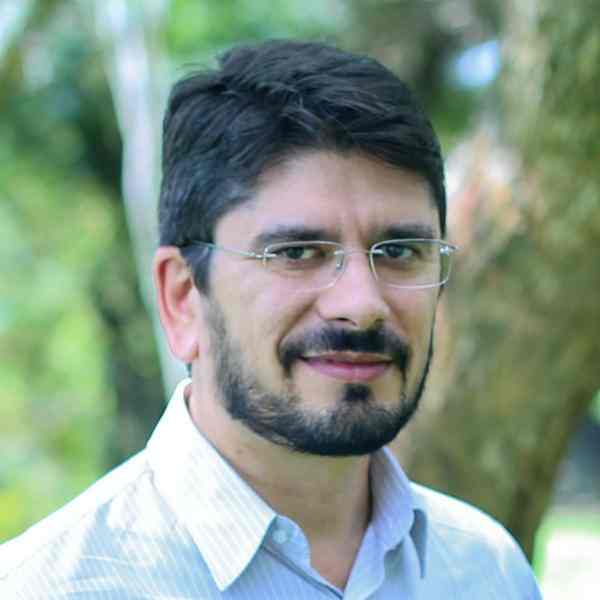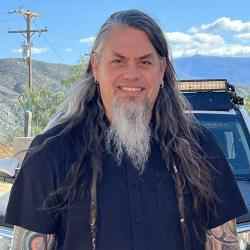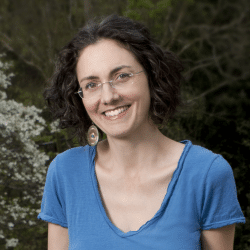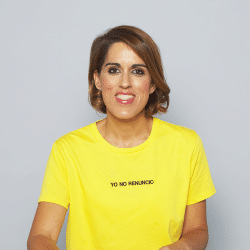Wprowadzenie
Valmir created Conexsus to act as an enabler and connector, filling the value chains’ gaps to strengthen a new economy, bypassing political and economic barriers, and creating a systemic impact. By having this approach, Conexsus empowers legitimate actors in their expertise field and bridges ground-breaking partnerships that makes possible a new economy in tune with environment conservation and regeneration.
Nowy pomysł
Valmir founded the Sustainable Connections Institute – Conexsus – in 2018 as a non-profit organization that activates the ecosystem of rural and forest community businesses to make it viable from an economic, social, and biodiversity point of view. Its strategies focus on three main bottlenecks of sustainable businesses experienced by associations, cooperatives, and small forest producers: access to financial mechanisms, strengthening production and business models, and connection with markets. To answer them, Valmir empowers producers who are already in the field without occupying or competing for space and resources. Conexsus’ legitimacy and relevance, achieved in less than two years, comes precisely from the network of partnerships that integrates innovative financial instruments and builds bridges between different sectors and organizations (small and medium-sized companies, the market, public banks, and other bodies). By acting as an enabler and connector, Conexsus fills the value chains’ gaps to strengthen a new economy, by passing political and economic barriers and creating a systemic impact.
Integrating personal and business development, Valmir strengthens leaders’ capacities to better manage production and their associations in order to build models customized to the local reality and with potential to increase market participation. Conexsus’ financing mechanisms bring hybrid solutions, combining reimbursable and non-reimbursable financing to allow community organizations to reach formal markets, diversify their sources of sustainability, and leverage their businesses. The investments follow the models of guarantees (endorsement), credit recovery and short-term fast loans.
Valmir is always working as an ecosystem connector and enabler. Only by working at this scale does he think it is feasible to protect and/or recover biodiversity and keep the forest. To scale up the impact, he is building a network of credit activators that guide extractivists and family farmers with planning, in order to obtain rural loans in large scale; the network leveraged R$ 4.6 million to 17 business prototypes from other investors (at a rate of 1:5). He is also developing financing models adapted to community businesses with Banco da Amazonia (a public bank). Valmir seeks to change not only the profile of rural credit in Brazil to sustainable activities (currently mostly used for agribusiness), but also to change the current economy based in monoculture and cattle.
Problem
From 1988 to 2017, 428,000 km² of native vegetation in the Legal Amazon were lost. In 2020, even with growing awareness of the impacts of deforestation, the situation has only gotten worse. The first trimester presented a 51% increase in the deforestation rate compared to 2019; in March 2020 alone, 254 km² of forests were cut down (more than twice the area of Paris). In Cerrado (another Brazilian biome), 4,000 km² were deforested in 2019. In the Atlantic Forest, a biome that has already lost almost 90% of its original coverage, rate of deforestation increased 27% between 2019 and 2020.
Deforestation is just one element in the cycle of socio-environmental degradation. Current culture and private habits are rooted in fast return and concentrated income, not commitment to environmental issues. This mindset also determines government and business practices: for example, the type of technical support provided by Governments prioritizing cattle and grains (monoculture), the procedures and requirements in accessing credit (to those who have guarantees), and in logistics (which prioritizes large volumes and large profits to intermediaries).
In addition to the loss of biodiversity and its global and local consequences, this results in an impoverishment of rural communities, who are limited to work with various challenges or to join this perverse cycle of destruction (driven by the lack of opportunities and support). These communities, who would prefer to preserve their environment, are often left with little economic choice but to carry out low-productivity, subsistence activities, which, in turn, are the ones that face the most difficulties in accessing credit and in connecting their products with the market. Although the work of small farmers has gained recognition in various public policies over the last 20 years, the challenge of reconciling such activities with sustainability and minimum profitability for a decent life is immense. These small farmers have to be compliant with legal, fiscal, sanitary, and marketing issues, and at the same time they compete against larger companies’ higher volume production and use of technology. According to the 2017 Agricultural Census, based on two Amazonian States, 88% of small farmers do not have access to technical assistance and 83% of them do not have access to credit. Over the last four years, the pressure to cut down the forest has increased, while the support for those trying to live in a healthy way with the forest was reduced, leaving these already struggling regions in a situation of extreme social and environmental vulnerability.
Strategia
Faced with these problems, Valmir is fostering a new ecosystem of economic development that preserves biodiversity and contributes to overcoming poverty and social exclusion. His model starts with the strengthening of productive capacity on the ground with native communities and local institutions, including creation of solutions to access credit and the market, offering holistic support on a large scale.
Valmir began testing this model with Conexsus Challenge: a program structured in three phases and that gave birth to the organization in 2018. The first phase was to map field actors. In order to ensure good coverage and build legitimacy, Valmir engaged more than 60 organizations in the identification of cooperatives and producer associations from all regions of Brazil, including indigenous, quilombolas, and land reform settlements, to ensure a broad, diversified mapping capable of understanding the different requirements of different territories. In the second phase, the program held 13 national seminars in partnership with various actors to listen carefully to the challenges faced by local communities and exchange information on sustainable development with 300 cooperatives (selected after the first phase). In the third phase, 100 cooperatives were accelerated, culminating in the mobilization of more than 80 companies potentially purchasing their sociobiodiversity products. The Conexsus Challenge consolidated the organization's trademark methodology: working together based on local institutions and knowledge and connecting different sectors that do not understand each other. By strengthening the ecosystem without supplanting the place of legitimate actors, Valmir isn’t viewed as having any partisan or political leanings and has begun to build legitimacy and relevance in a short period of time, which is rare in this field.
The lessons learned structured the organization on three fronts: 1. Development and strengthening of local socio-environmental leaders’ capacities, mainly management of their socio-productive organizations; 2. Promotion of fair-trade mechanisms to increase income for small producers, valuing sociobiodiversity; and 3. Expanding access to credit and other investments for biodiversity product's value chains.
The three fronts are interconnected. To foster local producers’ capacities, Conexus works as an accelerator, providing customized training and methodologies improved since the Conexsus Challenge, including business (management, marketing, finance etc.) and production aspects (sustainable technologies, growth of efficiency etc.). This is essential to prepare them for the market. Second, by guaranteeing high quality sustainable products that appeal to the market, Valmir is able to promote fair-trade through roadshows, events, and bilateral meetings to connect the two ends, strengthening the whole chain.
At the same time, this wouldn’t be possible without access to credit. One of the most innovative fronts at Conexsus is access to credit, a challenge tackled with a portfolio that ranges from direct credit to institutions, to support to access public loans. In addition to raising funds for Conexsus also offers credit with special conditions to community businesses and in socio-biodiversity product chains through CX Investimentos which is fully owned by Conexsus. As a result, Valmir has already delivered more than R$ 6 million in support for community businesses. The portfolio includes training and building bridges between producers and public banks to access credit. Through a partnership with Banco da Amazônia, Conexsus wants to expand the use of public funds to sustainable productive activities in the Amazon to 10% (today is less than 0.6%). Another partnership with Banco do Brasil is also underway for the same purpose. In the last two years, local organizations supported by Conexsus benefited more than 7,500 families, covering a territory with more than 175,000 people directly impacted.
Supporting a thousand socio-productive organizations has strengthened their role of bringing financial impacts to their members and communities served. CoopCerrado, for example, participated in the acceleration program. Its 2018 revenue was R$ 2 million; in 2021, after two loans from the Conexsus Fund and participation in business roadshows, CoopCerrado will earn more than R$7 million. Composed by 4000 local producers in five states, CoopCerrado was able to enhance their income generation for members by more than 300%. Besides the economic contribution, the cooperative became proof that a new, environmentally sustainable economy is possible. It was recognized with the 12th Edition of the Ecuador Prize as one of the top 10 initiatives, an award given every two years to community efforts to reduce poverty through the conservation and sustainable use of biodiversity.
With the pandemic, Conexsus launched emergency initiatives to respond to the crisis in partnership with Banco da Amazônia, including co-developing the Covid-19 Social and Environmental Response Plan, which supports 82 community businesses that received a total of R$6.4 million, impacting more than 10,500 thousand family farmers. Today, Valmir is designing an unprecedented partnership that creates a network of sustainable business activators, triggered by Conexsus, with the goal of ensuring that 4,200 family production units from traditional communities have access to R$ 30 million in public loans, technical assistance, and financial education. For the future, Valmir wants to prove the financial viability of restoring biodiversity on a large scale with small and medium-sized producers.
Osoba
Valmir was born into a poor family of farmers who migrated to Mato Grosso do Sul in search of new opportunities. He witnessed throughout his adolescence the territory's transition to monoculture business once occupied by small farmers. To support his family, he started working as a goldsmith while he was still young, which developed a holistic and attentive approach to everything he does today. His choice to study geography in university was an attempt to understand and provide answers to the context in which he lived.
At university, he engaged with the student movement and became a leader in his region. Convinced to bring about transformation through education, Valmir planned to become a teacher, but his plans changed with an invitation to implement at Mato Grosso do Sul a Secretariat with a commitment to sociobiodiversity. Later, the geographer undertook the mission of recreating the Secretariat for the Environment, managing water resources legislation, and structuring the system of public conservation units. His innovative and understanding approach led him through several public endeavors at the Ministry of the Environment, IBAMA, and Pará Environment Secretariat, which was an important milestone against deforestation in the Amazon. Always with a technical and highly qualified profile, Valmir’s experiences in the public sector were essential to understand the government from inside and build new solutions.
In 2010, he brought all this background to join Conservation International Brazil where he started to connect, now from a social organization perspective, different worlds that do not understand each other. Looking for a more groundbreaking contribution, Valmir was part of the design of many multilateral programs and initiatives aiming to disclosure the potential of economic, social, and environmental solutions. In 2018, the idea of Conexsus emerged, with the proposal of being an enabler organization that creates relationships of respect, empowerment of local actors, economic viable solutions on a large scale in tune with the forest.




